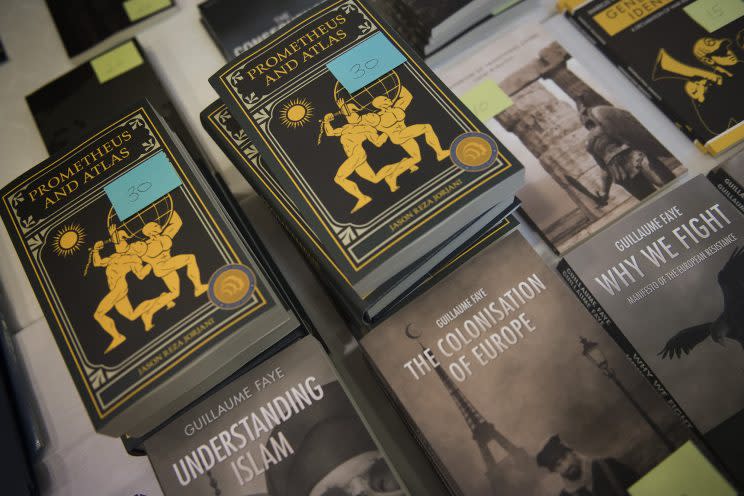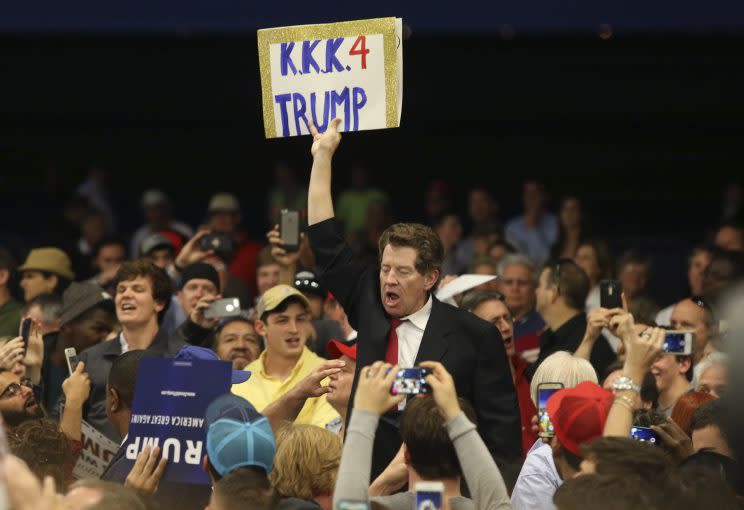What ‘alt-right’ really means: a glossary of terms
Many were shocked by images of people raising their arms in a Nazi salute and yelling “Hail Victory!” in celebration of Donald Trump’s presidential win at an “alt-right” conference in Washington, D.C., over the weekend.
Amid outrage and under pressure to distance himself from such overtly offensive behavior, the president-elect disavowed the so-called alt-right during a meeting with reporters at the New York Times Tuesday saying, “It’s not a group I want to energize.”
But he already has.
America might have just recently become aware of the alt-right, but the leaders of this racist, white nationalist movement have been inching their way from the political fringe into the mainstream for years, facilitated by their use of coded language.
The movement was emboldened by Trump’s candidacy, beginning with his early campaign promises to crack down on immigration from Mexico and Muslim countries. In August, Trump hired as his campaign CEO former Breitbart News chairman Steve Bannon, who has credited himself with transforming the conservative news site into “the platform of the alt-right.” Shortly after the election, Bannon was named chief strategist and senior counselor to the president-elect.
For the proponents of this far-right faction — defined largely by the belief that white culture in America is under attack — Trump’s presidential election was seen as proof that their views had been legitimized.
The Washington conference was sponsored by the white nationalist think tank National Policy Institute. Its theme was Trump’s victory, but the bulk of president Richard Spencer’s keynote speech was in line with the nationalist views Spencer has espoused since becoming head of the organization in 2011.
Loaded with a mix of Internet slang, racist and anti-Semitic euphemisms, and unabashed Nazi references, Spencer’s speech provides the perfect opportunity to decode the real message of the alt-right, starting with its name.

Alt-right: According to the Southern Poverty Law Center, which tracks hate groups, the term “alt-right” was coined by Spencer in 2008 as part of a “shallow re-branding” of white nationalism. Short for “alternative,” the “alt” refers to the movement’s rejection of both the mainstream media and the Republican establishment.
The definition of white nationalism varies, but the term essentially refers to an ideology that promotes a national identity based on race, often rooted in the perceived superiority of white people over those of other races. The NPI describes itself on its website as “dedicated to the heritage, identity, and future of people of European descent in the United States, and around the world.”
“They don’t want to be identified as white nationalists anymore,” the SPLC’s Heidi Beirich told Yahoo News back in August. “People associate that with white supremacy, which is what it is, so instead they changed it to ‘alt-right.’”
In fact, the through line that connects the nebulous collection of think tanks, bloggers, radio hosts and redditors that have come to make up the alt-right is a shared interest in protecting white American culture from a perceived threat of multiculturalism. Its acolytes have endorsed a variety of policies: ending social programs that benefit minorities; banning immigration to the U.S. from non-European or predominantly nonwhite countries; restricting U.S. citizenship to white Americans; eugenics, a program of controlled breeding to change the racial balance of the country in favor of whites.
Yet, as Beirich noted at the time, this new and less threatening term has enabled the movement to make its way from the farthest reaches of the fringe and “into right-wing politics,” just in time for Trump’s presidential campaign.

This spring, the Huffington Post reported that it had obtained emails exchanged between leaders of the white nationalist American Freedom Party, whose own presidential candidate dropped out of the race in frustration over the party’s apparent focus on getting Trump elected. According to HuffPost, the emails revealed conversations about ways to temper the party’s message in an effort to appear less extreme. Suggestions included identifying themselves as “white advocates” or “advocates of European heritage” instead of “white nationalists,” and replacing terms like “white genocide” with something more benign, like “dispossession.”
“They’re self-mainstreaming,” Beirich told Yahoo News in August. “But it should be called out for what it is, which is just pure racism.”
The SPLC notes that there are often overlaps between white nationalists and other extremist groups like neo-Nazis. But while neo-Nazis are motivated primarily by their hatred of Jews, white nationalists view all ethnic minorities as the enemy. The biggest division within the alt-right, according to SPLC senior fellow Mark Potok, is over whether Jews are evil.
Before the salutes and “heil” chants that stole the show on Saturday, Spencer dropped several apparently anti-Semitic slights and not-so-subtle references to Nazi slang.

Lügenpresse: Spencer elicited laughs and applause from the crowd in Washington over the weekend when he suggested that the “mainstream media” be referred to “in the original German: ‘Lügenpresse.’”
An old German phrase meaning “lying press,” Lügenpresse was adopted into the Nazi lexicon as a slur used to discredit Hitler’s critics in the media. In recent years, the phrase has had a resurgence in Germany among movements such as Patriotic Europeans Against the Islamization of the West, or PEGIDA, which, according to Breitbart News, “popularized the term to the point where it has become a pillar — even a rallying cry — for the nationalist, populist movements across the continent.”
The phrase had become so synonymous with Europe’s burgeoning anti-immigration movement that a panel of German linguists deemed “Lügenpresse” the worst German word of the year in 2014.
By the time Trump was riding his own wave of anti-Muslim, anti-immigrant and antimedia rhetoric to the Republican presidential nomination, the phrase had made its way to the United States. In Cleveland last month, energized Trump supporters were heard hurling the slur at the penned-up press following one of Trump’s last rallies before the election.

Golem: According to Jewish folklore, a golem is an anthropomorphic figure of clay or mud, created and magically brought to life by rabbis in order to protect the Jews.
After referring to the mainstream media as the “Lügenpresse,” Spencer went on to say, “One wonders if these people are people at all, or instead soulless golem.”
Victory of will: In an apparent allusion to the 1935 Nazi propaganda film “Triumph of the Will,” Spencer described Trump’s presidential election as “the victory of will.”
Cucks: Perhaps the most widely recognized word in the alt-right dictionary, “cuck,” or “cuckservative,” originated as a dig at establishment Republicans perceived as submissive, feminine and weak.
The portmanteau (cuckold + conservative = cuckservative) is also believed to have racist undertones, as “cuckold” may not only refer to a man whose wife is unfaithful, but to the more modern pornographic scenario involving a white man watching his wife have sex with a black man.
Over the course of the 2016 election, this emasculating label has evolved into an all-inclusive insult, applied to virtually anyone from Hillary Clinton supporters to political consultants of either party to, of course, the mainstream media.
Related term: Beta is used to describe weak, effeminate men, distinguished from “alpha males” like Trump.

Part of the reason the alt-right is so hard to define is, aside from annual gatherings like last weekend’s NPI conference, it exists mostly on the Internet. As such, its followers have developed a catalogue of memes and symbols to communicate online. Spencer’s speech was peppered with this Internet slang, including references to “meme magic,” the “God Emperor,” and the “Cult of Kek.”
Pepe the Frog: Much to the chagrin of his creator, this cartoon frog has become perhaps the most widely recognized face of the alt-right. Whether depicted as a Nazi soldier, a menacing Jew, or even as Trump, Pepe memes have become an all-encompassing symbol of anti-Semitism and white supremacy online.
(((Echo))): Since at least 2014, the triple parenthesis have been used as an anti-Semitic tool to identify Jews online. The Anti-Defamation League added the so-called echo to its database of hate symbols earlier this year after it started being used more aggressively to harass Jewish journalists on Twitter. Many have since added the triple parenthesis to their own Twitter handles as a means of reappropriating the symbol, though it’s still frequently used as an anti-Semitic dog whistle.
God Emperor: This grandiose title, bestowed upon the president-elect by fervent online supporters, originated last spring in Reddit’s densely populated pro-Trump forum, The_Donald.
One redditor’s explanation for the nickname offers some insight into the trolling — deliberately provocative — aspect that belies much of the alt-right conversation online.
“Just a term of endearment for our leader,” user NewJersey908 posted in The_Donald back in July. “We know he can’t literally be one but it whips the cucks into a frenzy saying that we literally want a dictator.”
Cult of Kek: According to Know Your Meme, the “Cult of Kek” is a satirical religion that originated on the anonymous imageboard site 4chan in November 2015, and has since been embraced by Trump supporters and described sarcastically as a “religion of peace,” a reference to yet another meme mocking Islam.
Memes, jokes and provocative Nazi rhetoric aside, about 20 minutes into his speech on Saturday, Spencer made clear what the alt-right is all about and how it will accomplish what its adherents consider the restoration of America.
“America was, until this past generation, a white country, designed for ourselves and our posterity,” said Spencer. “It is our creation, it is our inheritance and it belongs to us.”



